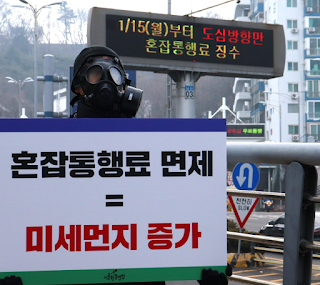Seoul's Transportation Quandary: A Call for Effective Climate-Centric Policies
In the heart of Seoul's bustling streets, where traffic congestion mirrors the frustration within Seoul's transportation policies, a recent decision to alter congestion charges has sparked concerns rather than relief.
Effective January 15, the congestion charge for Namsan Tunnels 1-3 will only be applied to vehicles entering the city center, halving the charge that has been in place since 1996. While the intention may be to manage traffic, the Seoul Environmental Alliance sees this decision as a half-hearted attempt that fails to address the complexities of the city's transportation challenges.
The decision to maintain a half-price congestion toll raises eyebrows among experts, who suggest that a fare hike might be necessary to effectively manage congestion. Despite this, the Seoul Metropolitan Government opts for a reduction in charges, raising questions about the city's commitment to combating traffic issues.
Beyond the congestion charge, the broader transportation policy of Seoul has come under scrutiny. The impact of the pandemic on public transit ridership has seen a surge in car use, and initiatives like the Climate Accompaniment Card, touted as groundbreaking, face criticism for their limited accessibility and low discount rates.
The recent push for river buses to alleviate congestion on the Gimpo Gold Line adds another layer of complexity to Seoul's transportation infrastructure. While touted as an investment, the low ridership rate and limited accessibility question the effectiveness of such policies.
Recent incidents, such as a bus crash in Myeongdong causing significant delays, highlight the inadequacies of Seoul's current transportation strategies. The call to operate electric cars without seats to alleviate subway congestion is met with skepticism about its practicality.
The Seoul Environmental Alliance raises its voice, calling for a comprehensive approach. They urge the city to raise congestion tolls, expand collection areas, announce a clear public transportation policy roadmap, and actively promote the stalled Green Transportation Promotion Area.
In a time where climate cooperation is imperative, the Seoul Environmental Alliance stands as a watchdog, ensuring that Seoul's transportation policies align with the urgent need to create a sustainable and people-centric city.
#SeoulTransportation, #CongestionPricing, #ClimateAction, #PublicTransportation

